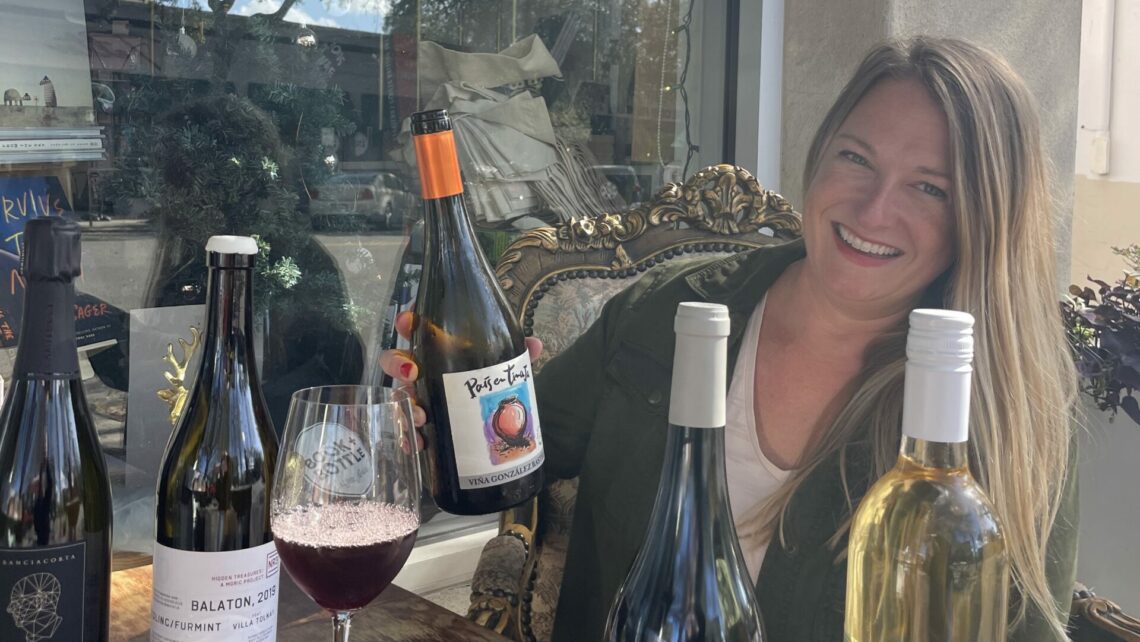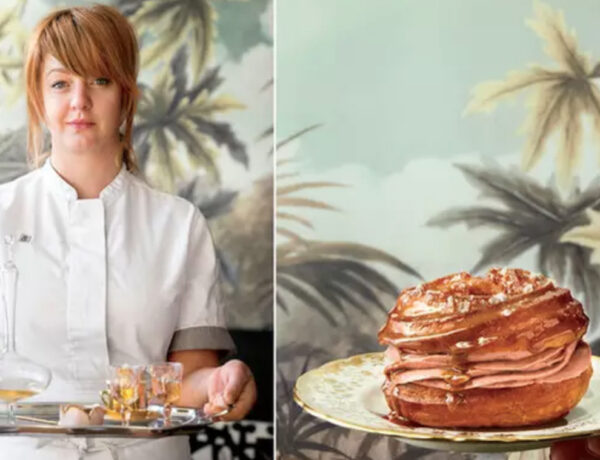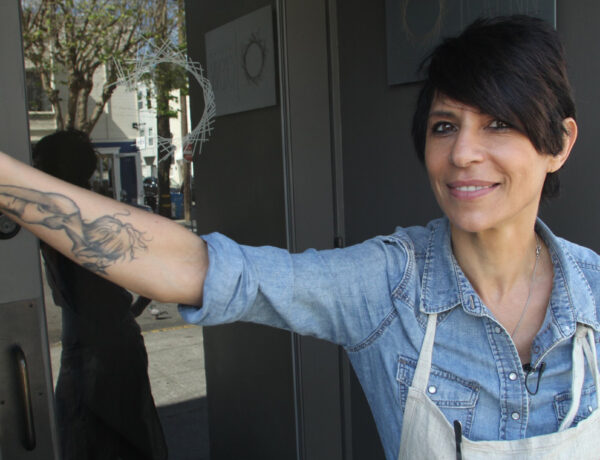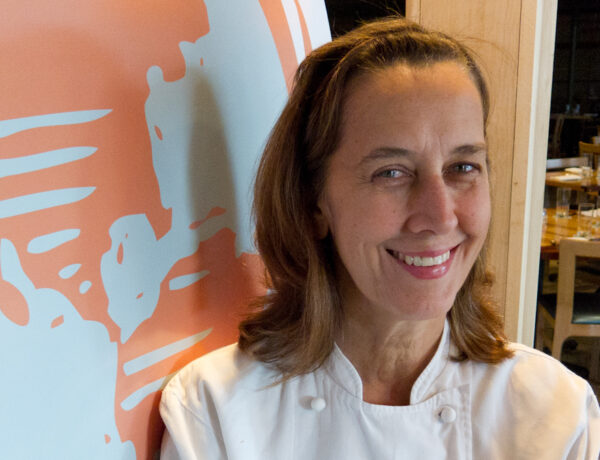Bookstore. Wine bar. Coffee shop. Literary community.
Terra Dunham’s hybrid “bookstore with wine” and “wine shop with books,” Book + Bottle, is much greater than the sum of its various parts.
An independent, woman-owned, values-driven, sustainably run, local-first business located in St. Petersburg, FL, Book + Bottle fosters a literary community that is a safe space for anyone to relax, read and feel at home.
We spoke with Dunham about the challenges she has faced as a business owner and why it’s important to have values and set boundaries.
Tell us about your career journey. How did you end up starting a hybrid bookstore/café/bottle shop?

In 2018, I was living in Colorado and working for a tech start-up. Working closely with those entrepreneurs, I felt a calling to start my own business and started playing around with business ideas. On a girls’ weekend in Chicago with my childhood St. Pete friends, we started joking about me moving home so we could open a bookstore/wine bar/flower shop!
When I got back from the trip I couldn’t shake the idea, and realized that a bookstore + wine bar would be the perfect business plan for St. Pete! Within three months I had sold my house, moved back to St. Pete, and started looking for commercial real estate!
Do you have any advice for women who want to start their own business in the food industry?
Yes, but the main piece of advice is for any gendered person—starting your own business takes a lot of work, and you have to love it, and WORK at it. There were so many times when I was overwhelmed, over my head, exhausted, and really wanted to quit. But, what sets successful businesses apart is that the entrepreneur doesn’t give up.
For me, just getting the business into existence was a struggle, so I barely had time to deal with the gender issues, but they were definitely there. So many times I was asked for more “proof,” more validation that I was serious and capable as an entrepreneur, and asked questions that men weren’t being asked. I was patronized frequently.
One day, in fact, I’m running around busting my ass, and a (male) customer was lounging in one of our rockers. I had someone come up to me, ask to speak to the owner, and, pointing to the man in the chair, asked if that was him. The man sitting there doing nothing apparently looked more authoritative and respectable than me!
With those things, I try to take a deep breath, smile at the ignorance and gently correct them. “No, I don’t have a business partner.” “No, my boyfriend isn’t the owner, I am.” “Yes, in fact, I am the person who makes decisions here…”
My biggest advice is to believe in yourself and know your worth because those types of comments can rile you up or wear you down. As an entrepreneur, you’ll have enough to worry about, so correct, and then just let that stuff go.
What’s the biggest challenge you have faced so far in your experience as a business owner?
Covid was so hard because we had no idea what to expect every day. I never knew what the city rules were going to be; if half my team was going to call in sick one day; whether I was doing the right thing by being open; and how to appropriately follow through on contact tracing claims. It was so exhausting. I definitely considered calling it in, blaming the failure on Covid. But, fortunately, I had staked everything I had on this business, so I had no choice but to keep going.
Other than the craziness of Covid, one of the biggest challenges for me has been saying, “no.” I am so full of caring (and people-pleasing, I’m sure!).
I want to say yes to everything and everybody, but that is truly not possible. At the very least saying yes to one thing means saying no to another. It takes practice to learn to trust yourself and that when I want to say no, I probably should say no.
We can’t carry every single local author’s book, we can’t host every single event, we can’t work with every single small business in town, and we can’t donate to every single school campaign. That is so hard!!! But what I’m learning is that saying “no” when it’s appropriate, and having boundaries, means that I can do the rest of my work even better, which in the long run will make everyone happier. (I recommend the book Boundary Boss by Terri Cole to help learn this skill!)
On your website, you say you’re an “independent, woman-owned, values-driven, sustainably run, local first business.” What do these values mean in practice?

Wow, everything!! We source wines made by women and by woman-owned wineries. Our shelves are full of diverse voices and stories of all sorts. The food that we serve is fresh and locally made by other woman-owned small businesses. We do pay more to get compostable disposables and help our customers prioritize sustainability by not offering big to-go containers for everything. We choose local distributors for many of our products when possible. We’re focused on equity for the team and have open conversations regularly. We hire carefully so we won’t have to lay people off or cut hours. And very importantly, we’ve prioritized an excellent in-store experience over an online-shipping model that many businesses switched to during Covid. We really do try to put our community first.
Now, that said, let me tell you a little story. I had a (free) business coach through St. Pete’s Small Business Development Center, and I was telling him one day, while we were running my numbers, about how I would spend more money to support independent, women-owned businesses and to be more sustainable in practice, even if that meant taking less in profits. He looked at me like I was crazy, and said, “Terra, Book + Bottle is a small, local, woman-owned, sustainable business. Support Book + Bottle, first!!!” That really stuck with me. It’s like the mentality of putting the oxygen mask on yourself first and then helping others with theirs. You’re no good to anyone if you’re dead!
What does being a woman and business owner in the food industry mean to you?
It means that I get to start directing the conversation where I want it to go. I can move the tide toward diversity, inclusion, value, and equality. Talk about having a seat at the table, I just BUILT a table, and get to invite people to join me at it!!
There has been conversation recently around the term “badass” and how its connotations suggest that women need to act masculine to succeed. What are your thoughts on the subject?
I never thought of the word “badass” as masculine, probably because I see so many examples of badass women in all forms. A perfect example is our Lady Leaders book club, full of women entrepreneurs who come together to discuss business-ownership topics. We are vulnerable, sometimes cry, listen respectfully to each other, and help support each other through relationship building. You can’t get more “feminine” than that! And I would say that every one of those ladies is a badass because they’re living their truth and mission every day and doing hard things.
I think every human is gifted with masculine and feminine traits, and we must choose which to impart in any given situation. I’ve caught myself acting aggressive (“masculine”) when I need something done and I’ll hit a brick wall. When I lean towards the feminine, caring, relationship-building side, I’m suddenly able to make progress and build trust and respect.
At the end of the day, women don’t need to act “masculine” to succeed, but they do need to be true to themselves, care deeply, and assert themselves when necessary. We’re all so much more powerful if we harness both sides.
Do you have any other thoughts or advice for female business owners in this industry?
Yes—just do it!! To all the women out there who have something they want to say or see in the world, please do it! Rachel Rodgers, in her book We Should All Be Millionaires, makes the point that since women are more likely to give back/volunteer/care about and for others, the more women entrepreneurs (and millionaires) there are, the more likely the world is to be a better place! More women in the food industry means more compassionate food, more sustainable food, kinder business practices, more diversity and inclusion, and a much better world for all of us!





